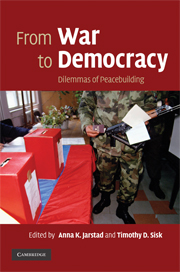Book contents
- Frontmatter
- Contents
- List of tables
- About the authors
- List of acronyms
- Acknowledgments
- Introduction
- Part I The perils of war-to-democracy transitions
- Part II The security context
- 2 Peacekeeping and democratization
- 3 Violence in war-to-democracy transitions
- Part III The political process
- Part IV International engagement
- References
- Index
3 - Violence in war-to-democracy transitions
Published online by Cambridge University Press: 14 May 2010
- Frontmatter
- Contents
- List of tables
- About the authors
- List of acronyms
- Acknowledgments
- Introduction
- Part I The perils of war-to-democracy transitions
- Part II The security context
- 2 Peacekeeping and democratization
- 3 Violence in war-to-democracy transitions
- Part III The political process
- Part IV International engagement
- References
- Index
Summary
In the Democratic Republic of Congo, violent clashes in the eastern Kivu region have continued unabated in spite of the transition process that began in 2003. In Afghanistan, insecurity has been a prominent feature of the post-Bonn period, and escalations in violence clustered around the presidential and parliamentary polls in 2004 and 2005. In Liberia, violent riots spread through the capital Monrovia in October 2004, in spite of the heavy United Nations peacekeeping presence on the ground. These examples illustrate that the signing of a peace deal and the introduction of democracy to a war-torn society do not prevent killings and atrocities from taking place – at least not in the short term.
This chapter asks two basic questions: Does democratization unintentionally create conditions conducive to violence? And, does the management of violence sometimes undermine the process of democratization? By combining insights from the literature on peacebuilding and democratization, the chapter brings to light central dilemmas related to violence and security in countries emerging from war that recently have entered a path toward democracy.
Two arguments about the problematic relationship between violence, democratization, and peace are put forward and discussed. Firstly, I argue that democratization creates new opportunities and motives for violence. The opening up of political space in the area of political competition (elections), and freedom of expression (media), as well as reforms of the security sector are crucial to democratization.
- Type
- Chapter
- Information
- From War to DemocracyDilemmas of Peacebuilding, pp. 80 - 102Publisher: Cambridge University PressPrint publication year: 2008
- 12
- Cited by



